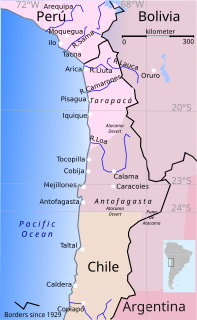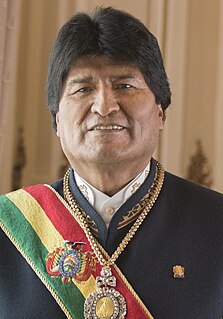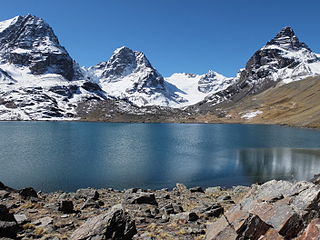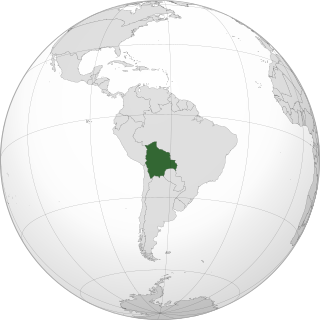Related Research Articles

Bolivia, officially the Plurinational State of Bolivia, is a landlocked country located in western-central South America. The constitutional capital is Sucre, while the seat of government and executive capital is La Paz. The largest city and principal industrial center is Santa Cruz de la Sierra, located on the Llanos Orientales, a mostly flat region in the east of the country.

La Paz, officially known as Nuestra Señora de La Paz, also named Chuqi Yapu (Chuquiago) in Aymara, is the seat of government of the Plurinational State of Bolivia. With an estimated 816,044 residents as of 2020, La Paz is the third-most populous city in Bolivia. Its metropolitan area, which is formed by La Paz, El Alto, Achocalla, Viacha, and Mecapaca makes up the second most populous urban area in Bolivia, with a population of 2.0 million, after Santa Cruz de la Sierra with a population of 2.3 million. It is also the capital of the La Paz Department.

Sucre is the constitutional capital of Bolivia, the capital of the Chuquisaca Department and the sixth most populous city in Bolivia. Located in the south-central part of the country, Sucre lies at an elevation of 2,810 metres. This relatively high altitude gives the city a subtropical highland climate with cool temperatures year round.

The politics of Bolivia takes place in a framework of a presidential representative democratic republic, whereby the president is head of state, head of government and head of a diverse multi-party system. Executive power is exercised by the government. Legislative power is vested in both the government and the two chambers of parliament. Both the Judiciary and the electoral branch are independent of the executive and the legislature. After the 2014 election, 53.1% of the seats in national parliament were held by women, a higher proportion of women than that of the population.

The President of Bolivia, officially known as the President of the Plurinational State of Bolivia, is head of state and head of government of Bolivia and the Captain General of the Armed Forces of Bolivia.

The War of the Pacific, also known as the Saltpeter War and by multiple other names, was a war between Chile and a Bolivian–Peruvian alliance from 1879 to 1884. Fought over Chilean claims on coastal Bolivian territory in the Atacama Desert, the war ended with a Chilean victory, which gained for the country a significant amount of resource-rich territory from Peru and Bolivia. The Chilean Army took Bolivia's nitrate-rich coastal region, and Peru was defeated by the Chilean Navy.

Juan Evo Morales Ayma is a Bolivian politician and former cocalero activist who served as the 65th President of Bolivia from 2006 to 2019. Widely regarded as the country's first president to come from its indigenous population, his administration focused on the implementation of leftist policies and combating the influence of the United States and multinational corporations. Ideologically a socialist, he has led the Movement for Socialism (MAS-IPSP) party since 1998.

Santa Cruz de la Sierra, commonly known as Santa Cruz, is the largest city in Bolivia and the capital of the Santa Cruz department.

The La Paz Department of Bolivia comprises 133,985 square kilometres (51,732 sq mi) with a 2012 census population of 2,706,359 inhabitants. It is situated at the western border of Bolivia, sharing Lake Titicaca with adjacent Peru. It contains the Cordillera Real, which reaches altitudes of 6.6 kilometers (4.1 mi). Northeast of the Cordillera Real are the Yungas, the steep eastern slopes of the Andes Mountains that make the transition to the Amazon River basin to the northeast. The capital of the department is the city of La Paz and is the administrative city and seat of government/national capital of Bolivia.

Cochabamba is a city and municipality in central Bolivia in a valley in the Andes mountain range. It is the capital of the Cochabamba Department and the fourth largest city in Bolivia, with a population of 630,587 according to the 2012 Bolivian census. Its name is from a compound of the Quechua words qucha "lake" and pampa, "open plain." Residents of the city and the surrounding areas are commonly referred to as cochalas or, more formally, cochabambinos.

The Bolivia national football team, also known as La Verde, has represented Bolivia in international football since 1926. Organized by the Bolivian Football Federation (FBF), it is one of the 10 members of FIFA's South American Football Confederation (CONMEBOL).

The Movement for Socialism–Political Instrument for the Sovereignty of the Peoples, alternately referred to as the Movement Toward Socialism or the Movement to Socialism, is a Bolivian left-wing populist and indigenist political party led by Evo Morales, founded in 1998. Its followers are known as Masistas.

El Alto is the second-largest city in Bolivia, located adjacent to La Paz in Pedro Domingo Murillo Province on the Altiplano highlands. El Alto is today one of Bolivia's fastest-growing urban centers, with an estimated population of 943,558 in 2020. It is also the highest major city in the world, with an average elevation of 4,000 m (13,123 ft).

Council of Ministers of Bolivia, or Cabinet of Bolivia, is part of the executive branch of the Bolivian government, consisting of the heads of the variable number of government ministries. The Council of Ministers are ministers of state and conduct the day-to-day business of public administration within Bolivia. The President of Bolivia may freely reorganize the executive branch, with the most recent comprehensive reorganization occurring in February 2009. Since then, the Ministry for the Legal Defense of the State has become the independent office of Solicitor General, and the Ministry of Communication has been created.

The history of the Jews in Bolivia stretches from the colonial period of Bolivia in the 16th century to the end of the 19th century. In the 19th century, Jewish merchants came to Bolivia, most of them taking local women as wives and founding families that merged into the mainstream Catholic society. This was often the case in the eastern regions of Santa Cruz, Tarija, Beni and Pando, where these merchants came either from Brazil or Argentina.

Luis Alberto Arce Catacora, also known as Lucho Arce, is a Bolivian politician serving as the 67th President of Bolivia since 2020. He served as Minister of Economy and Public Finance from 2006 to 2017 and in 2019 during the administration of Evo Morales. He is a member of the Movement for Socialism (MAS-IPSP) political party.
Anarchism in Bolivia has a relatively short but rich history, spanning over a hundred years, primarily linked to syndicalism, the peasantry, and various social movements. Its heyday was during the 20th century's first decades, between 1910 and 1930, but a number of contemporary movements still exist.
The Armed Forces of Bolivia has four main branches: Army, Navy, Air Force and the National Police Force. Each of the four branches has a similar structure, each having four pay grades: non-commissioned officers, senior non-commissioned officers, commissioned officers and general staff. However, the SNCO roles vary depending on the branch; some of these hold specialisations.

The COVID-19 pandemic in Bolivia is part of the worldwide pandemic of coronavirus disease 2019 caused by severe acute respiratory syndrome coronavirus 2. The virus was confirmed to have spread to Bolivia on 10 March 2020, when its first two cases were confirmed in the departments of Oruro and Santa Cruz.
References
- ↑ "PERIÓDICOS DIARIOS DE BOLIVIA". Presna Escrita. Retrieved 26 July 2012.